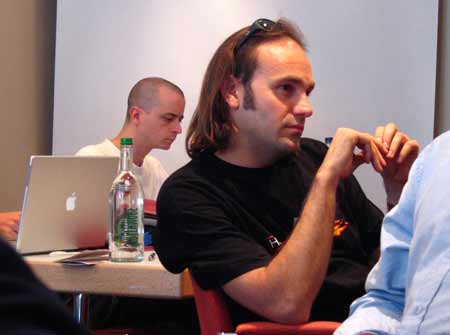
Mark Shuttleworth and a colleague at the Edubuntu Summit in London on July 1. Great event. Great project.


Mark Shuttleworth and a colleague at the Edubuntu Summit in London on July 1. Great event. Great project.

One of the most sinister arguments used by proponents of the ID Card bill (and other measures proposed by security freaks) is the canard that “if you’ve got nothing to hide then you have nothing to fear”. There’s a lovely piece by Muriel Gray in today’s Guardian which shows how wrong this cant can be. Sometimes, innocent people have very good reasons for wanting to maintain absolute privacy.
Life is nanotechnology that works.
Rita Colwell, Director, National Science Foundation, quoted in Ray Kurzweil’s new book.
Yep. Now we have the official confirmation.
UK premier Tony Blair has endorsed US President George Bush’s assertion that coalition troops must stay in Iraq as long as necessary to defeat terrorism.
Mr Blair told the Associated Press it was “vital” the US-led coalition remained until the country stabilised.Defeating “insurgents and terrorists” there would lead to the destruction of terrorism across the globe, he said.
Thanks to Miles Berry who alerted me to the fact Google Maps now provides satellite imagery of the UK. And doesn’t obscure sensitive locations either!
PartyGaming floated on the London Stock Exchange today.
PartyGaming’s shares rose 11% on the first day of dealings yesterday, defying doubters who thought it would be impossible to float a business in London whose activities are considered illegal in the US. Strong demand for shares in the world’s biggest online poker company meant the four founders sold extra into the flotation. The quartet of two Indian computer engineers plus an American former porn entrepreneur and her husband will now collect a combined £1bn in cash and retain stakes collectively worth £3.5bn.
PartyGaming peppered its float prospectus with warnings about the risk of criminal and civil proceedings in America, notably from the US Department of Justice, which regards gambling over the internet as illegal.
Funny how nobody in the City seems concerned about the ethics of this. I bet if I tried to float a company whose services were illegal in other jurisdictions I’d be condemned from a great height by men in suits from City institutions. (Unless, of course, it was making huge profits.)
Interesting fact no. 3443: the programmer who wrote the original software for PartyGaming is called Dikshit. He will collect £420m and keep a 30.4% stake worth £1.5bn.

When was the last time anyone gave you a telex number? (Does anyone still use telex?) From a manhole cover spotted today.
More: Wikipedia claims that “Telex is still in use for certain applications such as shipping, news, weather reporting and military command.”

… this is ridiculous.

Regular readers will know that I always photograph this display at Cambridge station when it’s showing a blue screen of death. But this morning there wasn’t even a screen, blue or otherwise. What can it mean?